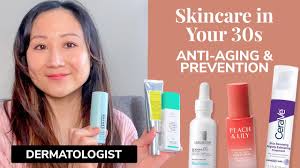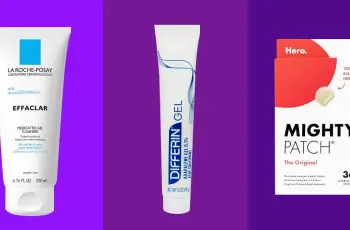
Dermatologist-Recommended Anti-Aging Skin Care Routines for Your 30s
Entering your 30s marks a crucial period in skincare, where proactive anti-aging measures become essential.
Whether you’re in the early, mid, or late stages of your 30s, this decade sets the stage for healthier, more youthful-looking skin.
Even if you’ve been diligent about sunscreen and other protective measures, skin shows the inevitable signs of aging due to accumulated damage.
Dermatologists often call this time “prejuvenation”—the phase where early interventions can help prevent sagging, wrinkles, and other aging concerns down the line.
Investing in the right products and a consistent routine can delay the need for more invasive procedures in the future, ultimately saving you time and money.
In this article, I’ll share dermatologist-approved anti-aging skincare tips and routines for your 30s—advice I give my dermatology patients, helping you build the perfect regimen for your skin.
As you start crafting your skincare routine, enjoy 20% off your next purchase with the code: STSBlog20 at checkout!
1. Why Begin Anti-Aging Ingredients in Your 30s?
As you approach your 30s, your skin starts to exhibit early signs of aging. While fine lines and wrinkles might not be immediately visible, changes are happening beneath the surface.
The skin loses collagen, elastin, and hyaluronic acid over time, all of which play a crucial role in maintaining its youthful appearance.
What causes skin aging?
DNA damage
Loss of collagen, elastin, and hyaluronic acid
Decreased stem cell function
Increase in senescent cells
If you’re in your 30s, it’s crucial to start targeting aging skin, even if you don’t yet see deep wrinkles. Preemptively addressing aging concerns is key.
This is the perfect time to start incorporating anti-aging practices into your daily routine.
2. Know Your Baumann Skin Type to Customize a Routine
Before diving into anti-aging products, it’s essential to understand your skin type. Dr. Leslie Baumann’s 16-skin type classification system helps identify your skin’s unique needs.
Knowing your Baumann Skin Type will allow you to tailor a skincare routine that not only targets aging but also addresses other skin concerns such as dryness, oiliness, acne, or pigmentation.
Here are the common concerns a tailored routine will address:
Dehydration: Dry skin due to a compromised skin barrier
Excess sebum production: Oily skin needing specific cleansers and moisturizers
Inflammation: Sensitive skin prone to acne, redness, or irritation
Hyperpigmentation: Dark spots and uneven skin tone
Aging: Fine lines and wrinkles as your skin loses firmness and elasticity.
Once you determine your skin type, you can build a customized skincare regimen that includes the best anti-aging products.
3. The Best Skincare Routine for Your 30s
In your 30s, you need to integrate anti-aging ingredients into your skincare. Sunscreen, retinoids, and antioxidants should be staples, but your routine will depend on your specific Baumann Skin Type. Rather than simply labeling your skin as “oily” or “dry,” consider all factors, including hyperpigmentation or inflammation, which may require targeted treatment.
For example:
Baumann Skin Type 4 (DSNW) might require a regimen targeting dry skin, rosacea, and sunspots.
Baumann Skin Type 7 (OSPW) might need a routine for oily skin and potential inflammation.
To find your skin type, take the Baumann Skin Type Quiz for a personalized skincare routine and product recommendations based on your skin’s needs.
4. Anti-Aging Skin Care Routines for Your 30s
By the time you’re 30, you have accumulated enough sun damage and environmental stressors to start an anti-aging skincare routine. Whether you see wrinkles or not, the signs of aging are starting to manifest.
In your 30s, targeting these concerns can prevent further damage and aging.
Common causes of skin aging:
DNA damage
Loss of collagen, elastin, and hyaluronic acid
Reduced stem cell function
An increase in senescent cells
Anti-Aging Skin Care Routine for Dry Skin in Your 30s
For dry skin, your focus should be on hydration and skin barrier protection. Dry skin is more prone to fine lines due to a lack of moisture, which is essential for enzyme function and skin elasticity.
Morning Routine:
Cleanser: Use a hydrating, non-foaming cleanser that preserves your skin’s natural oils.
Eye Cream: Apply an eye cream that targets fine lines and provides hydration to the delicate under-eye area.
Anti-Aging Serum: Use a serum to address aging signs, including fine lines, pigmentation, or acne.
Moisturizer: A rich, barrier-repairing moisturizer helps lock in hydration and strengthen your skin’s protective layer.
Sunscreen: Finish with a broad-spectrum SPF to prevent further UV damage.
Night Routine:
Cleanser: Start with a hydrating cleanser to remove makeup and impurities.
Eye Cream: Hydrate the delicate skin around your eyes.
Anti-Aging Serum: Use a serum that targets inflammation, wrinkles, or pigmentation.
Moisturizer: Apply a thick moisturizer to lock in moisture.
Retinoid: Use a retinoid to stimulate cell turnover, reduce wrinkles, and improve skin texture.
Anti-Aging Skin Care Routine for Oily Skin in Your 30s
Oily skin may be more resistant to fine lines, but balancing oil production while adding anti-aging ingredients is essential.
Oily skin also tends to suffer from large pores and acne, so the right products will help manage both concerns.
Morning Routine:
Cleanser: Choose a gentle foaming cleanser with salicylic acid to reduce oil.
Eye Cream: Opt for a lightweight eye cream to hydrate without adding extra oil.
Anti-Aging Serum: A lightweight serum with Vitamin C and niacinamide helps control oil and fight signs of aging.
Moisturizer: Use a light, non-comedogenic moisturizer to hydrate without clogging pores.
Sunscreen: Use a mattifying sunscreen to control oil while protecting from UV damage.
Night Routine:
Cleanser: Start with a foaming cleanser to remove excess oil and makeup.
Eye Cream: Use a lightweight eye cream for hydration.
Anti-Aging Serum: Choose a serum that addresses aging and oil control.
Moisturizer: Apply a lightweight, non-greasy moisturizer.
Retinoid: A retinoid will promote cell turnover and reduce pore size.
Anti-Aging Skin Care Routine for Sensitive Skin in Your 30s
Sensitive skin requires gentle, non-irritating ingredients to avoid flare-ups. When targeting aging concerns, it’s important to incorporate soothing products while still addressing acne or rosacea.
Morning Routine:
Cleanser: Use a gentle, non-irritating cleanser that matches your skin’s needs.
Eye Cream: Match your eye cream to concerns such as puffiness, dark circles, or fine lines.
Treatment Serum: Use a soothing serum to address acne, rosacea, or irritation.
Moisturizer: A calming, non-comedogenic moisturizer is ideal.
Sunscreen: Choose a sunscreen free of chemicals that could trigger irritation.
Night Routine:
Cleanser: Use a gentle cleanser that removes makeup and sunscreen without irritating.
Eye Cream: Apply a hydrating eye cream.
Treatment Serum: Use a soothing treatment serum for inflammation and redness.
Moisturizer: Apply a calming moisturizer that supports the skin barrier.
Retinoid: For acne-prone skin, a gentle retinoid helps with both aging and breakouts.
5. Key Anti-Aging Ingredients for Your 30s
Starting in your 30s, certain ingredients become essential to address the underlying causes of skin aging:
Retinoids: The most effective ingredient for increasing cell turnover, improving skin texture, and reducing fine lines.
Vitamin C: A powerful antioxidant that promotes collagen production and helps brighten the skin.
Exosomes: Tiny vesicles that help repair damaged skin and prevent cellular aging.
Growth Factors: These proteins stimulate skin regeneration and repair, particularly important in later decades.
Hyaluronic Acid: Keeps your skin hydrated, plump, and dewy, supporting other anti-aging ingredients.
Peptides: These amino acid chains help improve skin barrier function and stimulate collagen production.
Best Anti-Aging Products for 30+ Skin
By the time you’re in your 30s, the skin begins to lose its youthful elasticity, and maintaining a radiant complexion requires targeted interventions.
Retinoids and antioxidants, such as Vitamin C, are critical for this age range, as they protect against free radicals and boost collagen production.
6. The Science Behind Skin Aging in Your 30s
Understanding the underlying causes of aging can help guide your skincare choices. Here are some key factors:
DNA damage: Over time, DNA within your skin cells becomes damaged, leading to loss of skin elasticity and firmness.
Collagen loss: By your 30s, you may have lost up to 30% of your collagen, contributing to sagging and wrinkles.
Decreased stem cell function: As you age, your skin’s ability to regenerate slows down, leading to dullness and fine lines.
Conclusion
Building an anti-aging skincare routine in your 30s is crucial for long-term skin health.
The right combination of products—along with consistent sun protection and regular use of active ingredients like retinoids, Vitamin C, and hyaluronic acid—can help you prevent premature aging.
Embrace the power of prevention, and you’ll look back at your 30s with radiant, healthy skin!


